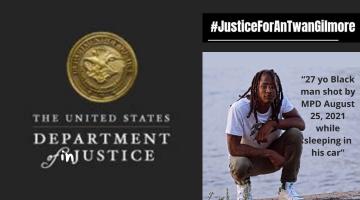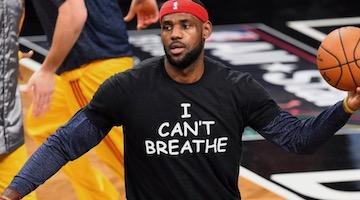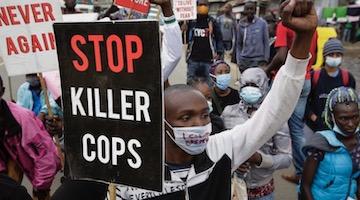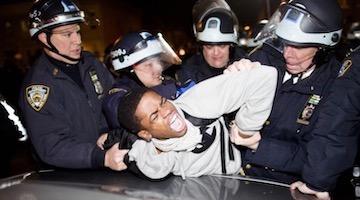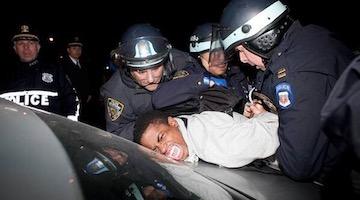Frank Sterling arrested during protest against Antioch, California police chief.
A KPFA reporter experienced violent encounters with police in Antioch, California and advocates on behalf of others. The chief of police has moved on to another city but victims of abuse have not received justice.
Frank Sterling is a KPFA Radio reporter, a KPFA First Voice Radio Apprentice Instructor, a Native American, and an advocate for the homeless and victims of police brutality. He lives in Antioch, California on the northern edge of the San Francisco Bay Area, in far eastern Contra Costa County. As an activist journalist he first began covering high profile police brutality cases that had already received wide media attention, like those of Eric Garner, Michael Brown, George Floyd, and locally, Oscar Grant. Eventually he began to realize that similar cases were happening around him in Antioch, but that without media coverage, they were going largely unnoticed.
In September 2021, Frank was arrested protesting on the edge of a going away party for Tammany Brooks, Antioch’s first Black police chief. I spoke to Frank after his pre-trial hearing last week, which I also attended to support him. While I was outside court, a Black woman who had also come to support Frank told me that police had shot and killed her son, once in the head and twice in the back, in the parking lot of a nearby Nation’s Hamburgers, where they alleged he had been trying to buy some drugs.
Ann Garrison: Frank Sterling, tell us what you’re doing out here at Contra Costa County Superior Court in Pittsburgh, California.
Frank Sterling; I'm out here because they're trying to charge me with resisting arrest during a protest against the last Antioch Police Chief.
AG: That would be Chief Tammany Brooks, Antioch’s first Black police chief, now the deputy police chief in Boise, Idaho. Right?
FS: That’s him.
AG: Antioch is a city of roughly 111,000 on the northern outskirts of the San Francisco Bay Area, and Boise, the capital and largest city in Idaho, is a city of roughly 226,000. So this was an upward career move for Tammany Brooks even though he’s not chief there yet.
FS: I think that’s fair to say.
AG: So what were you protesting?
FS: It was a going away party for Brooks as he was leaving for his new job in Boise. He was being celebrated by a group called Antioch Backs the Blue and a couple other community organizations. And a small group of activists, including myself, came to say that he should not be celebrated because of the crimes, we felt, he had committed against our community.
AG: This was September 21 last year, 2021, in an Antioch public park, right?
FS: That’s right.
AG: And what happened?
FS: Well, basically, the people that “back the back the blue” and the other people that were there to celebrate the chief—not everybody, but a couple of instigators—wanted to rip our signs out of our hands, and urged others to join in blocking us from getting near their party.
Basically, they were doing goodbye photo ops with the chief. There was a lot of handshaking and taking their pictures with the chief. They gave him a plaque and told him how much they loved him.
While that was going on, we were in the background trying to hold up our protest signs and get them into their photo ops, so that, unless they cropped us out, we’d be there.
So they started trying to block us out of their photos. Some of them started trying to take our signs and blocked us physically. Then the band started playing some music and they all started dancing in our direction until it turned into a melee. People tried to take our signs and our bullhorn from us. I wasn't in a physical altercation, but other members of my group were being physically attacked, especially by one angry woman.
AG: Was she a police officer?
FS: No, but she was one of the organizers of the event. Eventually the police sort of pushed them aside and arrested us.
AG: In the pictures there are three or four officers holding you down on the ground. It looked a lot like the George Floyd arrest.
FS: Yeah, one of them tackled me, then they surrounded me on the ground, zapped me twice with a taser, and cuffed me.
AG: What was it you were protesting about Tammany Brooks history as Antioch Police Chief?
FS: There were a few things. First, he had been celebrated when he first got there as someone who was going to make serious change. And he was our first African American police chief. The outgoing chief hailed him as a team player, and he had this great story about growing up poor in San Francisco’s Bay View Hunter’s Point neighborhood, having a troubled childhood, and rising up to be this chief of police in spite of it.
But one of the things that he did was to authorize surveillance of our activists by tracking their phones and their cars through data tracking apps and other surveillance technologies.
And he actually authorized a high profile arrest of one of our activists. There’s an overpass over in Lafayette where they do the pro-Trump rallies and they arrested her protesting over there in kind of a secret undercover operation where plainclothes cops grabbed her and dragged her to a car and then police literally came out of the bushes wearing Antioch police badges.
One of the most high profile cases of a police killing in Antioch while Tammany Brooks was chief was that of Angelo Quinto. The police knelt on this young man's back and neck and killed him. And Chief Brooks instructed the medical staff at the hospital not to speak directly with the family, allowing only the police to have communications with the family.
The police told the family they were treating their son in the hospital even though he was already dead. He was there, but they already knew that he was deceased, and had stopped breathing at the house. The family saw the chest compressions there.
Anyways, they wouldn't let the medical team talk to them and only let the police talk to him. And the police lied to the family. So those were two of the things that actually brought me to the park to protest Tammany Brooks goodbye celebration.
AG: You’re a KPFA Radio journalist, as I am, and you do reports on police brutality cases all around the San Francisco Bay Area. Do you think that might be why they arrested you at the park protest and why you’re now facing charges?
FS: It could be. It’s well known in town that I won a previous case in 2009, when the police burst into a party I was having at my house. Someone had said we were disturbing the peace, so police came to my house. First they tried to pull one of my friends out, then they attacked me. They beat me with their fists and flashlights, and finally put me in a choke hold until I went unconscious. When I came too, one of the officers kicked me in the face and broke my nose. I had bruises and marks up and down my back and had to go to the hospital.
Then they tried to pin bogus charges on me for battery on an officer, great bodily harm to an officer, and other felonies. Those charges were hanging over me from 2009 to 2014—I could have gone to prison—but finally I was totally cleared.
AG: I remember that other KPFA journalists offered to go to court and testify to your character, as I would have if you’d asked me.
FS: Yeah, that was nice, having so much support.
Since then, and even before that, I was covering police brutality stories, and learning about what was happening in my own city in Antioch. First I was following high profile cases like Alan Blueford, cases that people, including me, had heard of here and in other cities and states.
Then I started learning more about what happened right here in Antioch, not just to me but to people like Rocky Brooks. In 2015, a year after I was cleared of all charges, he was suffocated and crushed, a lot like George Floyd was.
Another man, Wendell Celestial, was put in a chokehold in a downtown Antioch street in the middle of the night and choked to death. And there were plenty of other ones, you know, around the time of my arrest at my own party and before and after that.
AG: You’ve been reporting on these cases for a long time, and I’m sure the police remember that you beat them in court five years after they raided your party and brutalized you. Do you think they targeted you in particular at the Chief Brooks’s going away party?
FS: I don't know what the police motivations were this time, whether or not they were singling me out. I can't read their minds, but I know they know who I am because of my activism in town, especially last summer after George Floyd was killed. Like a lot of cities across the Bay Area and the country, we saw a rise in protests, especially protests outside the police department and multiple marches to the downtown police station. People were on the corner outside, holding up signs saying “I can't breathe” and stuff like that. I was part of a lot of that and they knew who I was.
AG: I hear you’ve also been vocal at Antioch City Council meetings.
FS: Yeah, especially since the pandemic started and they started holding them online. That makes it easy for me to get there and tell them what I think about a lot of things.
Frank Sterling is a KPFA Radio reporter, a KPFA First Voice Radio Apprentice Instructor, and an advocate for the homeless and victims of police brutality.
Ann Garrison is a Black Agenda Report Contributing Editor based in the San Francisco Bay Area. In 2014, she received the Victoire Ingabire Umuhoza Democracy and Peace Prize for her reporting on conflict in the African Great Lakes Region. She can be reached on Twitter @AnnGarrison and at ann(at)anngarrison(dot)com.





